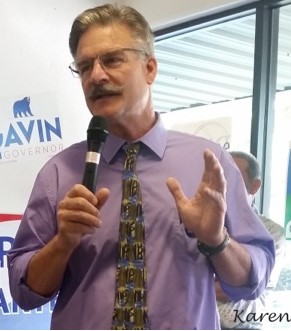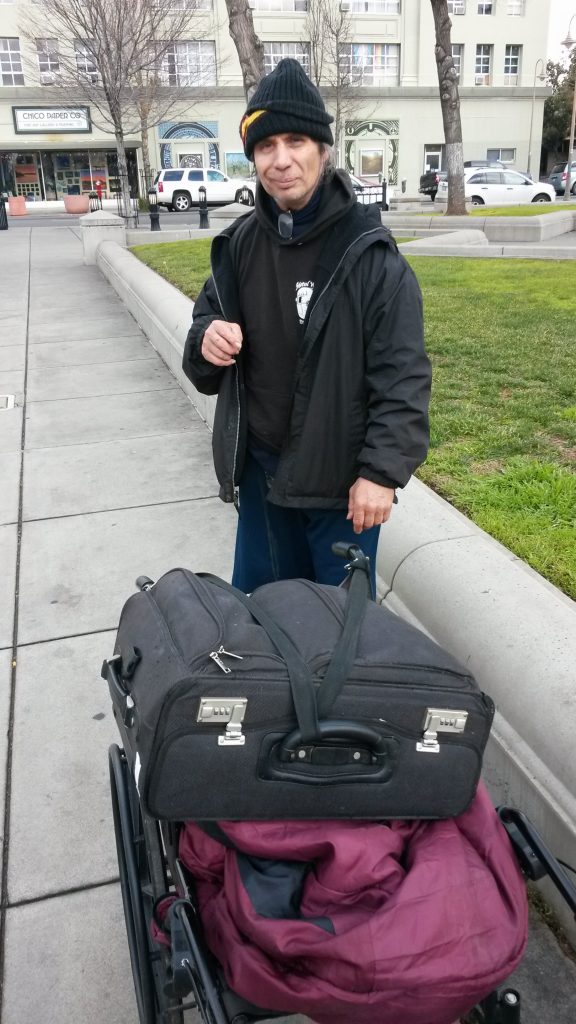by Scott Huber
After recent experiences, I’m compelled to present a counter-narrative to those who have spoken out against a “Code Blue” cold-weather shelter (and other sheltering ideas).

Chico City Councilmember Scott Huber.
At the Feb. 5 Chico City Council meeting, a minority of speakers expressed their reasons for opposing a city-sponsored cold-weather shelter. Their reasons included (paraphrased) “sheltering these people is not Chico’s responsibility, it is the responsibility of Butte County or the non-profits.” Others asserted that because this form of shelter would be open to anyone it would allow for “drug addicts, criminals and sexual predators” (again paraphrased).
Cold-weather sheltering is a safety measure, potentially a life-saving measure. Since when did saving a life come with so many prerequisites? Imagine a person falling overboard, and the potential rescuer shouting out “Sorry you’ll have to wait for the county!” or “Have you ever been convicted of a felony?” This implies that some lives have more value than others, a notion that I trust most people reject. The reality is that neither the county nor the non-profits are immediately able to provide cold-weather solutions, and we are — so we must be the ones to step-up.
This feeling that we shouldn’t be providing shelter to the homeless is often justified by applying the label of “criminal vagrant” to the entire homeless population. The term is steeped in ignorance of the individual stories of so many of our unhoused residents. Here’s a representative story that I can personally vouch for.
In the late 1980s, I was a member at a local health club. Every day a clearly debilitated young man would limp in, dressed in a tank top and shorts, mount a treadmill and doggedly work himself into a lather. By all appearances he seemed to be trying to reverse the symptoms of his disability. His name was John Ryan. He had sustained brain damage and a variety of other physical problems as the result of a terrible car accident.

Fast forward 30 years to Feb. 7, 2019 — the night our newly erected warming center opened in Depot Park. While I was there looking over the facility I thought that I recognized a gaunt, gray-haired man in disheveled clothing leaning on a walker. I asked him if he had once belonged to a particular health club in town. It was John Ryan.
I had trouble understanding him, he had been rendered unable to communicate clearly 30 years prior. After much listening I was able to piece together that he had been evicted from the residence where he had been sharing space with another disabled person. He asked me for help with a couple of items.
On his walker was a spent colostomy bag, the contents of which covered the seat of the walker, the ground underneath it and much of the clothing he was wearing. He lacked the belt that allowed him to secure another bag to the “port” in his stomach. A new bag could be seen dangling unsupported below his soiled sweater. He asked if I could get a belt for him, and suggested that the Enloe Medical Center ER was obligated to provide them. He also asked if I could pick up his personal possessions, including his medical supplies, from his estranged roommate.
Fortunately for me, local angel and crisis care specialist Lisa Currier showed up as I was talking to John and offered to help me pick up his stuff. We stopped by Enloe, where Lisa negotiated to get a new belt and associated supplies, then we drove to north Chico and picked up John’s possessions, which were waiting for us on the front lawn. We returned to the warming shelter with the supplies, allowing John to address his most immediate needs.
A couple of days later, I happened to encounter John again downtown. He was accompanied by another young man that referred to himself as John’s bodyguard. A bodyguard is not an unreasonable need for John; he was shuffling around town in frigid weather, carrying most of what he owned on his walker, a sitting duck had someone decided to take his stuff. He needed another belt for his colostomy bag, which I drove to Enloe and got for him. I was able to get his mother’s phone number in Arizona, and he expressed a willingness to live with her but said he couldn’t afford to get there. I have since made contact with both his mom and his son in Washington state, both of whom have expressed a willingness to have him come live with them. I’m hopeful that within the week we can secure a ride for him to one of these two family members.
John is one of street people who are carelessly lumped under the label of ‘‘criminal vagrant.”
Recently at Safe Space I encountered a stroke victim who was unable to verbalize that he needed some aspirin; he had to write it down for us that he uses a walker and is incapable of financially supporting himself. Also escaping the cold at Safe Space were a chronically homeless paraplegic woman, a bright but delusional young man who sees everything as a biblical directive, and a host of others whose physical and mental challenges render them incapable of conventional employment or even the most basic functions required for acquiring housing.
Are there “criminal vagrants” gaming the system by camouflaging themselves among the unhoused population? Undoubtedly yes — just as there are criminals that hide out among the housed, and in business and government. Do the criminal actions of the few warrant the abandonment of those unable to adequately care for themselves? Absolutely not. We, the fortunate and privileged, have a moral obligation to first help assure that our fellow humans are safe from harm, and secondly to develop a plan to help them raise themselves to a better existence, to the extent that we are able.
Editor’s update: Chico City Council member Scott Huber reports that it took the efforts of “a village” of community members, but John Ryan was reunited with his son.

I agree. The answer is a lot of very low income housing ASAP. CHAT’s Simplicity Village is the only plan approved by the City that offers 33 new homes this year. We are experiencing the most tragic and urgent human crisis to hit the streets of Chico in our lifetimes. Simplicity Village has the potential to house the most amount of people, for the least amount of money, in the least amount of time.